
Fahey CD releases listed in order, first
to last, "Red Cross" being the sole exception
Click
here to purchase "Hitomi"

Fahey CD releases listed in order, first
to last, "Red Cross" being the sole exception
Click
here to purchase "Hitomi"
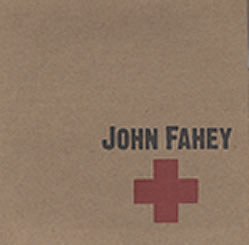
|
Red Cross (Revenant #104)Revenant Records. On February 11, 2003, we released our late founder John Fahey's final album, Red Cross. An intensely personal project for John which he completed a few months before his death and originally intended for release in 2001, Red Cross can be heard as Fahey coming full circle, reinvigorated, at peace with both past and present. Includes spine-tingling interpretations of Irving Berlin's "Remember" and the Gershwins' "Summertime," alongside a number of stellar new Fahey originals. Featuring the acoustic fingerpicking of yore as well as some shimmering electric guitar vamps, Red Cross touches those peculiarly Faheyian regions in the heart and mind. A final, sparkling gem from a true American original. Buy Red Cross |
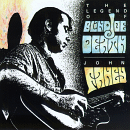
|
The Legend of Blind Joe DeathA musicologist as well as a musician of singular stripe, John Fahey has been instrumental in the re-discovery of lost bluesmen such as Skip James and Bukka White during the late '50s. In 1959 he financed his own debut album, supposedly sharing billing with a certain Blind Joe Death, though nobody was taken in by such a gentle ruse. Only a handful of pressings were made. With a sweet of irony he was rediscovered himself a few years later and he re-recorded the same set of tunes first in 1964 and then again in 1967, in stereo. All three albums, chart his growth into a superlative acoustic guitar technician capable of blending elements of country, blues and ragtime into a style that in its spare, haunting beauty is uniquely his own. --Peter Kane |
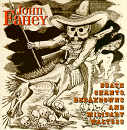
|
Death Chants, Breakdowns and Military WaltzesThis inspired collection is a combination reissue all the music from John Fahey's groundbreaking 1964 disc Death Chants and his re-recorded version from 1967. The clear (and thankfully not digitally messed-with) sound plus context-heavy, insightful liner notes by Mr. Byron Coley make the reissue a must even for folks who own the original artifacts. For the guitar aficionados, on the 1964 recordings Fahey uses a late 1890's Martin New Yorker. Fahey on a period instrument is exciting - the performance late-night boozy, energized. |
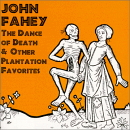
|
The Dance of Death and Other Plantation FavoritesFaheys third Takoma record and is one of his best. The flights of fancy of the original pieces are contrasted with traditional tunes from country blues and old-time Appalachian sources, and the two strains come together on tracks like "Variations on the Coocoo. Faheys dark sound, quirky humor, and moody slide work are all in evidence on this release, which also includes four bonus tracks from the original 1964 session, released here for the first time, Tulip (aka When You Wore a Tulip and I Wore a Big Red Rose), Daisy (aka A Bicycle Built for Two), The Siege of Sevastopol, Steel Guitar Rag. |
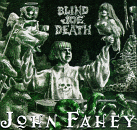
|
The Transfiguration of Blind Joe DeathA strange man, John Fahey, with an unusual set of guitar styles. This album, originally released on Riverboat Records and later reissued by Fahey's own Takoma label, has a lot of rough edges in terms of the recording but a tremendous amount of power when it comes to the music. Fahey at the top of his game, alternately playful and dark, so there's never a dull moment. There is always something new to be heard on each playing. -- Steven McDonald, All-Music Guide (Five Stars) |
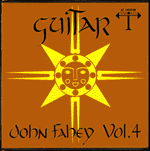
|
The Great San Bernardino Birthday PartyJF in 1990 called this masterpiece "a histrionic, disorganised outpouring of blather". The final section begins with a tune he learned in Texas from Little Hat Jones called "Bye Bye My Honey Fare Thee Well" (vide. OK. 8815: "Bye Bye Blues," by Jones, recorded in San Antonio, Saturday, June 14, 1930.). The last few pitches, played in open G minor tuning (as is the rest of the song, with the exception of the Jones tune) is augmented with the use of a butcher knife (instead of the customary bottleneck) which thus produces a Hawaiian effect. The last six notes express futility, a hopelessness and general existential despair complicated by ontological absurdity. |
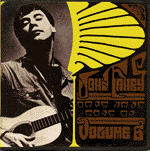
|
Days Have Gone ByWhen John Fahey recorded this album in 1967, he was at the peak of his considerable powers as a musician, writer, and composer. His fingerpicking is astounding; surely no stronger thumb ever struck a bass string than the one that drove "Night Train to Valhalla," no surer fingers ever plucked a melody than the ones that coaxed the epic sweep of "The Portland Cement Factory of Monolith, California" from six strands of steel and a wooden box with a hole in it. This album includes some of Fahey's best-loved tunes, including the aforementioned songs, the bluesy "Revolt of the Dyke Brigade" (Fahey was tweaking the sensitivities of folk music audiences before anyone knew what political incorrectness was), and the uncategorizable "Raga Called Pat." The latter isn't Indian music at all, but a sprawling two-part odyssey constructed from train whistles, bird calls, and dancing guitar figures. This well-mastered and lovingly packaged reissue includes two sets of liner notes; Fahey's originals are a hilariously obtuse parody of poetic, philosophical, and historical pretensions, while a new set by journalist and poet Monica Kendrick acknowledges his passing mere months before this record came out by paying homage to Fahey's enduring artistry. --Bill Meyer |
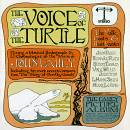
|
The Voice of the TurtleThis fine release comes with a very neat booklet that chronicles a Fahey & Co. journey through the Mississippi Delta canvassing for old records, is such a potential for conversation you should have a party to discuss it. It has a photograph of Beautiful Linda Getchell among others, even Evil Devil Woman, also photographs of Fahey's relatives. And who is that singing? A famous, popular and fun release. I don't even know who's playing on this in spots. Does anybody know? |
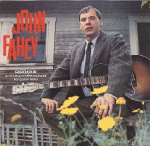
|
Requia & Other Compositions For Guitar SoloJohn Fahey has finally arrived at his (pre)destination - that of a cultural icon and purveyor of the lost sounds of yesterday. I bought this CD on impulse, being familiar with the man but not his music. They are both national treasures. His mastery of the guitar shines through, melding the traditional themes of the first two requia and "When the Catfish Is In Bloom" with the more modern, soundscape nature of the Requiem for Molly. Just as Fahey discovered and soaked in the music of this nation's blues forebears, so should you do the same with his own contribution to a unique musical heritage. --Thanks to: jaerter@davidson.edu from Davidson, NC |
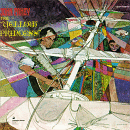
|
The Yellow PrincessJohn Fahey's willingness to incorporate hard edges, ungainly joins and sagging tempos have given his acoustic guitar music an emotional whack which players like Leo Kottke and Bert Jansch can't quite summon. This, a re-issue of his eighth album from 1968, is by no means his best but there is a ragged majesty about some of the playing, particularly on his adaptation of the Saint-Saens theme which forms the title track and the ringing flourishes of Lion, a requiem for a favorite cat. |
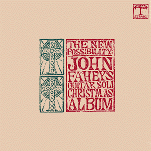
|
The New Possibility John Fahey's Guitar Soli Christmas AlbumJohn Fahey has made a habit of recording a new album of Christmas music every five or six years, but The New Possibility, which was originally released in 1968, is still his best. On it, Fahey has pulled off the near miraculous feat of taking old holiday chestnuts like "Joy to the World" and "It Came upon a Midnight Clear" and making them sound fresh. When he plays a Travis-picking version of "O Come All Ye Faithful" or he recasts "Silent Night, Holy Night" as bottleneck blues, you get the feeling Fahey is treating the music with respect rather then piety. Also included in this reissue are six tracks from his 1975 release Christmas with John Fahey, Vol. II. The songs feature some nice duets with Rick Ruskin, but the arrangements lack some of the quirkiness that made The New Possibility sound unique. This isn't Bing Crosby singing "White Christmas," but it is a modern holiday classic nonetheless. --Michael Simmons |
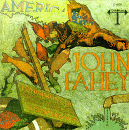
|
AmericaPlayful, tragic, bluesy, happy, profound. Illustrated with Fahey's vision of the future. Brilliant. And even better, Fahey only released half of it in 1970, convinced that a double album wouldn't sell. Half of it sat in the can for over 25 years! Here you have the whole thing. One of the ten best releases of the 90's. Cannot be too highly recommended. Pick it up now that you can get it! What we need now is for Fantasy to release "The Great San Bernardino Birthday Party" and "Days Have Gone By". Rumors are flying and we have their number. Buy America |
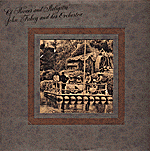
|
Of Rivers and ReligionIn the 1970s Fahey recorded three "John Fahey and his Orchestra" albums, and this is the first. But it's not an orchestra, that's just a little joke, it's a dixieland jazz band plus some other assorted acoustic accompanists. Fahey fans are divided - some like the trad jazz tracks and some hate them. Fahey himself thought they were the greatest bunch of musicians he'd ever worked with. Anyhow, this album is a real mixed bag. "Steamboat" is a collection of lazy generic slide riffs, very pretty but nothing too challenging; the two medleys (guitar duets) are extremely dull; "Funeral Song" is a rerecording of an old fave from "Requia" and is great but unnecessary; "Lord Have Mercy" is full-on trad jazz and is tedious (sorry John); "Song" is a solo guitar meditation, that's okay - so that leaves only two gems - "Texas and Pacific" which is a trumpet led jazz tune, great melody, and the gradual increase of pace works like magic, and the heavenly "Dixie Pig", which must be in my top 5 Fahey tunes - on that one the dobro player gets the best bits. I think I'll have it played at my funeral service. There won't be a dry eye in the place. But, well, two out of seven ain't that good by anyone's reckoning. - Paul Bryant |
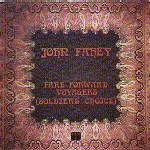
|
Fare Forward Voyagers (Soldier's Choice)Hard to find. This is Fahey's non-Christian religious album. On the reverse of the sleeve there is this: "I respectfully dedicate this album to my guru, Swami Satchidananda". Inside the first issue of the album there was a 4 page pamphlet entitled "Yogaville West", which, we were informed, was "a growing spiritual community in the beautiful mountains of Lake County, Northern California". Surmounting three pictures of the community was the following message: "I would like to introduce you to this healthy, spiritually based concept of living. The 46 people living here follow the ideals of Integral Yoga as taught by Swami Satchidananda. To the extent that I have practised these techniques, they really seem to work. - John Fahey" -notes from The Discography |
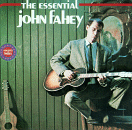
|
The Essential John FaheyBy 1967 Fahey was at the height of his compositional and playing power, and pieces like "The Yellow Princess" and "When the Catfish is in Bloom" are truly stunning. Even the less flamboyant - say, "Charles A Lee" - have a mesmerising beauty. There is not one wasted second on this brilliant cd (which consists of 2 albums "Yellow Princess" and "Requia" minus a long guitar-plus-sound-effects piece called "Requiem for Molly" which you're better off without). Listen to the ringing intro to "The Yellow Princess", or its helterskelter finale; melt away to the simple tune which wraps up "Russell Blaine Cooper"; delight in the whole thing. Guitar perfection. --Paul Bryant of Nottingham |
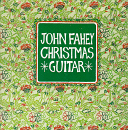
|
John Fahey Christmas GuitarJohn Fahey is a visionary, an iconoclast, and a plain old American weirdo. He's also a brilliant acoustic guitarist, whose earnestness is matched only by his oblique sense of humor. These performances--ranging from the cheery "Joy to the World" and "We Three Kings" to the thoughtful "Bells of St. Mary's" and "In the Bleak Midwinter"--are pretty straightforward though. Some tend toward the academic, but all are quite beautiful in their own reserved way, making this the perfect unintrusive album for a quiet Christmas gathering or an evening by the hearth. The notoriously squirrely Fahey might be the last guy you'd invite over for eggnog, but you'd be foolish not to let his exquisite music into your home. --Michael Ruby |
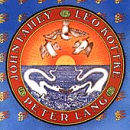
|
Leo Kottke, Peter Lang & John FaheyWhat Piccard and Jones did with a balloon in '99, Kottke, Lang & Fahey did way back in '74 with a guitar. They took centuries old technology and redefined its capabilities by applying innovation, vision and courage. For the unenlightened that thought the guitar was limited to either ear splitting rock riffs and/or, campfire strum-alongs, this trio lifts the listener far above the peaks of expected performance and shows them the light. A must have for fingerstyle guitar enthusiasts? Certainly, but more importantly, a must have for anyone who has no idea what fingerstyle guitar is. These are the guitar-tists that changed the guitar-picker paradigm and defined the fingerstyle genre. ---Dana J. Valley, Melbourne, Australia |
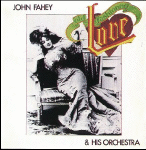
|
Old Fashioned LoveThough his abiding affection for music glad or sad is obvious here, be not deceived that he has joined the nostalgia craze. Any overly sentimental hand he extends has a buzzer in it. --Guitar Player |
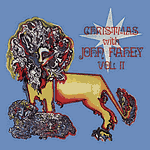
|
Christmas With John Fahey Vol. IITaken up with mostly standards, Fahey digs into hymns and sacred material much like he would on any other album; it just so happens that he happens to do this with the holiday tracks that all parties secular and non have been privy to their whole lives ("Oh Christmas Tree," "White Christmas," et al.) […] There is enough deviation and skillful interpretation within these two sides of vinyl to solidify any claims to greatness. If you were able to judge the album by side two alone, this would be up there with America or Fare Forward Voyagers. -Jon Pruett, AllMusic |
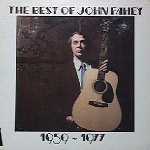
|
The Best of John Fahey 1959–1977This single-CD best-of has a fair amount of material in common with Rhino's 2-CD "Return Of The Repressed" collection, but is a more compact and cohesive reading of the first half of Fahey's career. Stunning acoustic guitar work with the undying creativity that Fahey infused into all his work. If you haven't heard Fahey's work before, this is an excellent starting point; exploration into his original, full albums is also highly recommended. |
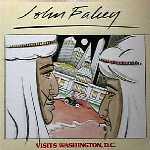
|
John Fahey Visits Washington D.C.From his review for the UK-based Record Collector, critic Sid Smith gave the album 4 stars, writing "... although the landscape may look and sound familiar, nothing is quite what it seems. Circuitous, complex lines are unfurled into rare, blooming chords in much the way a magician pulls flowers out of his pocket. However, it’s the gothic rumbles of "Guitar Lamento" that remind us how Fahey’s use of space and haunting repetition created glorious epic moods tempered with a bleak intensity that still resonates." John Fahey Visits Washington D.C. was reissued on CD in 2008 by Ace Records. |
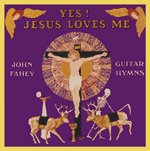
|
Yes! Jesus Loves MeThis is on that you're pretty much on your own to track down. Good luck! Vinyl copies, the occasional CD, cassettes, go for it. |
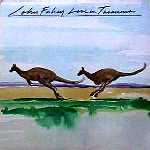
|
Live in TasmaniaLive in Tasmania, an album by American fingerstyle guitarist and composer John Fahey, was originally released in 1981. It was his first live album release after 18 albums. It was reissued on Takoma in 2004. Stellar. Buy Live in Tasmania |

|
RailroadCritic Stewart Voegtlin praised the 2007 reissue in Stylus, singling out the tracks "Oneonta", "Imitation Train Whistles/Po' Boy" and "Afternoon Espee Through Salem". He commented Fahey "coasted through enough records; he labored honestly at others. Railroad undoubtedly shows both approaches, but holds enough magic in its shallow well to keep those that seek a bare bones account of the man that made it mired in stubborn stories that do little to lay the self-proclaimed 'primitive' bare." In his liner notes for the Ace Records 2007 reissue, author Kris Needs calls Railroad "...a timelessly evocative tribute to America’s mighty man-made artery." Buy Railroad |

|
Let Go…seldom has his mercurial brilliance been so beautifully presented as on "Let Go". Working with producer Terry Robb, Fahey has assembled the usual eclectic mix of material... What distinguishes this lp, however, is Robb's superb production, in which the string-scraping sounds common to most acoustic guitar recordings are virtually eliminated, allowing the rich instrumental textures to shine through. Robb is an extraordinarily sympathetic accompanist, too, but the real attraction here is Fahey, whose startling harmonic inventions and rough-hewn elegance of attack are as mesmerizing as ever. - Rolling Stone. August 2, 1984 Buy Let Go |
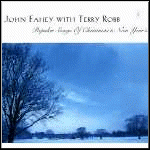
|
John Fahey with Terry RobbPopular Songs of Christmas and New YearThe remarkable acoustic guitarist really stretches out on this generous 19-song compendium of holiday tunes guaranteed to jog the memory and make you ponder why these songs aren't heard more often. Fahey (joined here and there by second guitarist Terry Robb) plucks his way lovingly through carols such as "Do You Hear What I Hear?" and "Jolly Old Saint Nick," his unique style ever-so-subtly evoking the ambiance of bygone days. Fahey also brings a smile via non- traditional songs like "Skater's Waltz" and "The Holly and the Ivy," making this the kind of disc you can slip on any time of year for a quick, wintry pick-me-up. --David Sprague |
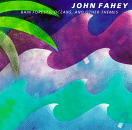
|
Rain Forests, Oceans, And Other ThemesFahey's recent albums have all been praised, but Rain Forests stands out. A fine example of an artist in full command of his art, an excellently recorded, essential album. Diehards may have to be patient at first, but, more importantly, newcomers will delight in this step forward of the acoustic guitar. -- from Folk Roots magazine |
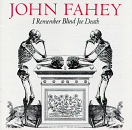
|
I Remember Blind Joe DeathWhat the Critics Say: John Fahey is the daddy of all the American fingerstyle acoustic guitarists who've emerged since the War. He made his first record, Blind Joe Death, in 1959 and since then he has managed to continue making records of marginal commercial appeal, many of them utterly magical. His grounding in the blues dovetails with his academic interest in folklore and mythology and his range of rags, reels and airs has the stately deliberation and creaking demeanor of genuinely old music. Even when he lashes out with the bottleneck as on Gaucho there is nothing facile about his approach. -David Hepworth |
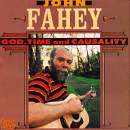
|
God, Time and CausalityRecorded upon the completion of a long road tour, Fahey himself has been heard to remark that he feels this is his best album. Many evenings of performance help make these sessions unsurpassed for nimble execution of some very technical fingerwork. Undoubtedly it offers us some of Fahey's finest moments with the acoustic guitar. This is an all-out effort with an in-concert flavor. An album to enjoy thoroughly and appreciate for his extraordinary sense of tempo alone. |
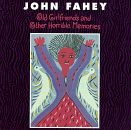
|
Old Girlfriends and Other Horrible MemoriesIt seems apparent that many people who have this Fahey album, which is not a bad one at all, bought it for the title alone. I had to have THAT one! Uproarious laughter usually follows, making it a catalyst in any relationship-building encounter&helip; |
|
|
The John Fahey Christmas AlbumThis gifted guitarist possesses a remarkable blend of power and delicacy, and an unparalleled ear for the beauty of music both ancient and new. On this lovely collection, Fahey (accompanied by piano and cello) takes listeners on a tour that spans different cultures (Ireland and Spain, to name but two) and eras. Blending older sanctified music such as "Angels from the Realms of Glory" and "Mary Had a Baby" with thematically related pieces such as "Lo How a Rose E'er Blooms," Fahey captures the spirit of December 25th. --David Sprague |
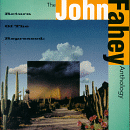
|
Return of the Repressed - The John Fahey AnthologyA very well selected collection of Fahey's finest offerings on a two-CD set. Fahey's warm, inviting manner will appeal to anyone who likes to hear good music played on an acoustic guitar. The liner notes, in booklet form, inform and entertain - great photos as well. Contains Fahey's own comments on each song includes the guitar tuning to help those who want to give it a try and need a clue. An excellent gift idea to turn someone on to John Fahey, well worth the price. |
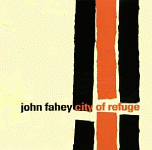
|
City of RefugeFor certain it has little to do soundwise w/ Fahey's more traditional guitar stylings, but plenty of association and reference to his earlier experiments in musique concrete. Sounds like some weird cross between Derek Bailey and John Cage maybe. I especially enjoy the opening overture, which sounds like Fahey jamming with an old noisy refrigerator motor. This CD is grating at times but I've got a lot of respect for Fahey for announcing his 'comeback' with such a thoroughly uncompromising disc of new material. - a fan Buy City of Refuge |
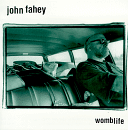
|
WomblifeFor those in mystery about Fahey's foray into new territory, having heard this word "alternative" bantered about and not fully willing to take the plunge, I highly recommend Womblife as a sensible jumping-in place. For whatever reason, you owe it to yourself to try this one on for size. Out of the ordinary? Yes, it is. And of all the "alternative" Fahey albums to date, this is the one that is so coherent, gentle and well developed you find yourself putting it on the player over and over, not to memorize it, but to bask in the ambiance it creates. A lovely avant-garde listen that won't let you down if you are one to appreciate Fahey's genius for interval havoc that just keeps on working. The version of "Juana" here is an acoustic precursor to the wonderful live electric version to follow on Georgia Stomps and is a lovely tune with which to end the album. --Melissa Buy Womblife |
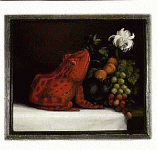
|
The Epiphany of Glenn JonesBacked by Cul de Sac, The Epiphany of Glenn Jones represents some of the best playing of fingerstyle guitarist John Fahey in a long time. It's a perfect blend of moody, acoustic ballads, and improvised noodling, all featuring overtly simple guitar and sampler structures. Fahey fans should buy it for "Gamelan Guitar" alone--a repetitive little ditty that features Fahey accompanied by the tinkling sound effects of closely-mic'd dry beans and rice poured into bowls and over guitar strings. With Fahey's newfound status as an avant-gardist, along with his improving health, you'd think these sessions would be a cakewalk for Cul de Sac. But the liner notes present a different take. Album title namesake Glenn Jones isn't some mythical Fahey persona (such as Blind Joe Death), but rather Cul de Sac's frontman. In a detailed essay, Jones describes his follies of trying to work with his musical hero, Fahey: mood swings, arguments, personal and artistic differences, and more. Nevertheless, Cul de Sac and Fahey somehow worked their problems out and this resulting album turned out exceptionally well. --Jason Verlinde |
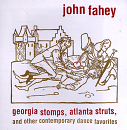
|
Georgia Stomps, Atlanta Struts, and Other Contemporary Dance FavoritesThere's still big, bluesy, idiosyncratic sound ready to flow from his fingers, and his playing has mellowed a bit, gone off on tangents that will likely most interest people who already are fans. Recorded in an intimate theater in Atlanta in 1997, this disc shows Fahey improvising a slow-burning set of original and traditional compositions. The way he ruminates and dissects "House of the Rising Sun," in particular, is fascinating and fresh. Buy Georgia Stomps, Atlanta Struts, and Other Contemporary Dance Favorites |
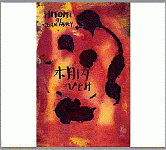
|
HitomiAnd on this fine release, his age (61) and his negotiation of his physical changes, seem only to have refined his music. A beautifully packaged release on new label LivHouse Records finds Fahey alone, his sound fragile and spare, supported by various reverb, echo, digital delay, otherwise it's a stark naked sound. It's a fractured, spectral blues which Fahey spins out here, across eight beguiling, graceful tracks, carefully feeling his way through age-old motifs and manouevres - occasionally sorrowful plangent cries, occasionally rumbustious rolling characters. In sudden flurries of minimalist patterns, his guitar can sound koto-like - these blues are as Japanese as they are African-American - it's a music imbued with ancient dignity. --Dan Hill "Last night I went to John Fahey's web site, placed an order, registered with PayPal, received an e-mail from you, and then got word that it's already in transit to me. If that's not the skillful application of efficiency, I don't know what is." Price: $38.00 - free shipping. Guaranteed in stock.
|
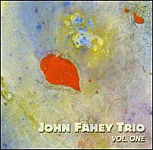
|
John Fahey Trio Vol. OneIn Fahey's Last Phase (96-01) he was experimenting like crazy and was telling everyone that all the old stuff was horrible, only his new stuff was any good. This of course was nonsense. He was just trying to be the oldest punk in town. The Trio work is Fahey at his most noisy, tuneless and experimental. Some of it just sounds like roadworks outside your house. Guitar, keyboard and a ton of effects, plus at times JF intoning very funny parts of liner notes to previous albums. It's fairly excruciating to my shell-like ears, but I'm aware that some folks LIKE this kind of thing - there are dozens of noise bands out there. Fahey's favourites were Einsturzende Neubauten - so if you like those bad boys, this is for you. But if you love "Sunflower River Blues" or "The Death of the Clayton Peacock" then invest in a pack of Anadin Extra before pressing Play. You have been warned. |

|
And again, Red Cross (Revenant #104)Released Feb 11, 2003. Revenant Records.On February 11, 2003, we'll release our late founder John Fahey's final album, Red Cross. An intensely personal project for John which he completed a few months before his death and originally intended for release in 2001, Red Cross can be heard as Fahey coming full circle, reinvigorated, at peace with both past and present. Includes spine-tingling interpretations of Irving Berlin's "Remember" and the Gershwins' "Summertime," alongside a number of stellar new Fahey originals. Featuring the acoustic fingerpicking of yore as well as some shimmering electric guitar vamps, Red Cross touches those peculiarly Faheyian regions in the heart and mind. A final, sparkling gem from a true American original. - words stolen from Revenant Records without giving it a second thought. Buy Red Cross |